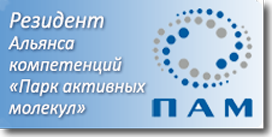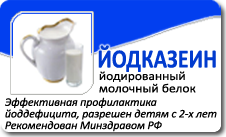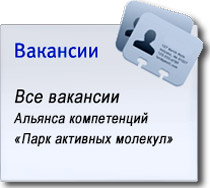Iodcasein as a possible factor of iodine supplementation in children
Авторы: A.N.Arynchyn, T.V.Mokhort, E.F.Konoplya, V.V.Shahtarin, A.F.Tsyb, R.A.RozievГод: 2002
Издание: Journal of Endocrinological Investigation.- 2002.- V.25, Suppl. to N7. P.94. P118
скачать файл ( *.pdf 15 Кб )
Реферат
Iodized salt is the wide spread method of iodine supplementation, but it is not enough sufficient in Belarus now. Some new methods such as usage of iodized food additives are going to be more popular.
To study the effectiveness of iodcasein as a component of iodized bread in iodine supplementation of iodine deficient and iodine replete children.
Urine iodine excretion determined with cerium-arsenicum method, was studied in 310 healthy children aged 10-17 as well as palpation and ultrasonography of thyroid. All children were pupils of boarding school with standardized iodine sufficient diet. All children were examined twice before and after 40 days of usage of iodised bread. All other sources of stable iodine in examined children were excluded.
Initial degree of ID was estimated as light (goiter rate through palpation was 13.4%, frequency of ID - 61.1%). After 40 days usage of bread with iodcasein number of children with goiter significantly decreased to 3.8% and median of urinary iodine increased. No any side effects were observed. Group 2 consisted of iodine replete children and after 40 days usage of iodised bread no any changes in goiter rate and iodine urine excretion were observed. Important fact is that no statistically significant increase of urine iodine excretion was revealed. It is possible to suggest that initial level of iodine supplementation plays the major role in iodine metabolism excluding absorption of extra amount of stable iodine and preventing iodine excess.
The obtained results show good effectiveness of iodcasein as a food compound of bread for the iodine supplementation without any side effects and risk of iodine excess.








